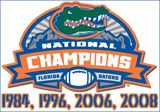“Style Points”, Bad Football, and the BCS
Whenever the media starts talking using the same phrase, you know they are trying to convince you of something. As of this past weekend, there wasn’t a talking head in the college football world that wasn’t suddenly talking about “style points” as being very important to deciding who would gain that coveted number 2 BCS slot.
What are “style points”? Well, it doesn’t seem to have an exact definition, but based on the fawning we have seen for USC after they beat Notre Dame, apparently it means laying a ton of points on your opponents. But why the very sudden interest in “style points”?
As I sat Sunday going over the new BCS poll, mulling exactly what could be meant by “style points”, it hit me like blitzing line backer – “style points” is a code word for bad football.
Now, the yapping sports media would never describe it as that. But, what we are being told to desire by the pundits out there is essentially bad football. Let’s start by taking last year’s BCS “national championship” game as an example. What was then hailed as an “instant classic” was, in fact, a blatant example of bad football. While it might have been entertaining, and it was, it was not good, sound fundamental football. Take a look at these stats –
Texas
Rushing Yards – 289
Passing Yards – 267
Total Yards – 556
USC
Rushing Yards – 209
Passing Yards – 365
Total Yards – 574
As I said, exciting, yes. But good football? Not a chance. Was there any defense in this game? With a total score of 79 points, and a total of 1130 yards of offense, the teams scored essentially every time they had the ball and did not turn it over. That is terrible football, no matter what else you want to call it.
USC, in fact, had the 35th ranked scoring defense in the nation in 2005, giving up 23 points per game. With even an mediocre defense, they might have won the game.
Scoring, as we all know, is what the “public” wants, whether it is home runs in baseball, raining 3’s in basketball, or long touchdown bombs in football. But as we know from pro football, scoring does not usually win championships (just as good pitching usually rules in baseball). In every Super Bowl since 1980, the losing team has averaged 17 points. Rarely does the loser score more than 20. A team scoring as many points as USC did last year has never lost the Super Bowl.
In pro football, good defenses get to the title game – they simply beat quality opposing offenses during the playoffs. In the current college system, however, point scoring is favored over stout defenses, and the system, as currently designed, picks the hot offenses over the tough defenses, and in fact avoids the match-up between a good offense and defense where ever possible.
While Texas and USC were fated to play in 2005 (as the only undefeated teams), take a look at what happened in 2004. At season’s end, there were 3 undefeated teams – USC, Oklahoma, and Auburn. Their season stats are as follows –
USC
Avg. Points Scored – 38
Avg. Points Against – 13
Oklahoma
Avg. Points Scored – 35
Avg. Points Against – 17
Auburn
Avg. Points Scored – 32
Avg. Points Against – 11
Because Oklahoma was able to beat a very marginal Colorado team in the Big 12 Championship 42-3, they essentially got the “style” points they needed to play USC for the title. Auburn beat a pretty good Tennessee team 38-28 that year in the SEC Championship, and was ranked number 1 in the nation in scoring defense that year. Yet they got passed on for the more “stylish” Oklahoma, which in turn was destroyed by USC for the national title 55-19. But hey, a lot of points were scored!
Would Auburn have done better? Almost certainly. Averaging only 11 points given up per game, the 28 by Tennessee was the most anyone had scored on them all season. Oklahoma, by contrast, was surrendering 17 points per game, and had given up 35 points to opponents on 2 separate occasions.
Not to mention, Auburn had the nation’s 5th toughest schedule per opponent’s records in 2004, versus 11th for Oklahoma and 18th for USC. Auburn could have potentially slowed down USC’s offensive attack, actually resulting in a good football game. Pity we never got the chance to see it.
2006 is shaping up exactly the same. We are told that the 42-39 victory by Ohio State over Michigan was another “instant classic”, even though the teams gave up 900 yards total offense. Michigan, supposedly still a title contender, actually surrendered 503 yards to Ohio State with no turnovers. Giving up 503 yards of total offense is bad football, no matter what the nattering heads say. Chances are, they would get totally whacked by Ohio State were they to play them again, despite how close the score appeared.
Of the 3 remaining 1 loss “contenders”, here is how their scoring defenses stack up at this point
Florida – 12.3 ppg (4th in nation)
Michigan – 14.6 ppg (9th in nation)
USC – 15.1 ppg (12th in nation)
Ohio State, by the way, is 2nd, with 10.4
As for total defense, it looks like –
Florida – 265 ypg (10th in nation)
Michigan – 254 ypg (6th in nation)
USC – 299 ypg (28th in nation)
Ohio State is 13th, with 273 ypg.
USC is getting the respect it currently is based almost purely on offensive prowess. Because they beat a supposedly top ranked Notre Dame 44-24, they have “style”. That Notre Dame team, however, is currently ranked 45th in total defense, surrendering an average of 320.5 yards per game. Western Michigan, Cincinnati and Illinois have better defenses, statistically, than Notre Dame. But the media wants scoring – and that is what they are going to get, good football be damned.
It may be that whoever plays Ohio State is doomed, especially because OSU is top ranked offensively also. But, are the pollsters and sports media pushing at team towards Ohio State that might actually slow their offense? Not in the least. Instead of a Michigan or Florida, both top 10 ranked in both defensive stats, they are pushing a team ranked 28th in total defense because that team puts up gaudy offensive numbers. The end result will be predictable – Ohio State should beat USC, but there will be lots of points scored.
Which is a shame. We know, from pro football, that good defenses are usually enough to win championships (think Bears 1985, Ravens 2001, Steelers 2005). And, when given a chance, defense oriented teams have largely succeeded in national title games. Consider the last four SEC National Champions –
2003 LSU - defeated Oklahoma 21-14. LSU averaged only 11 ppg given on defense that year.
1998 Tennessee – defeated FSU 23-16. UT averaged 14 ppg that year given on defense.
1996 Florida – defeated FSU 52-20. Yeah, everyone knows about Florida’s offense that year. But on defense, Florida was surrendering 17 ppg that year, far better than the year before when they were destroyed by Nebraska.
1992 Alabama – defeated Miami 34-13. Alabama gave up an incredible 9 ppg that year, and held a vaunted Miami offense to 17 points less than their season average.
Of the past 5 times SEC teams have gotten to play for the title, they won 4. In those 4 wins, they surrendered only 63 total points, or 16 per game. Think about that when you look at the 38 points Texas gave up last year and won.
Also think about this – with Florida surrendering only 12 points per game this season, we compare favorably on defense not only to the great SEC teams, but to the great defensive national champs of recent years, like Ohio State in 2002 that gave up only 13 ppg that year.
In college football, however, the media feeds the public thirst for flashy scoring, so top quality defenses never get a chance to compete, as if they undoubtedly would were there a playoff system. Which means, in turn, that a league like the SEC built on defense will never be flashy enough to compete for the media’s attention, even with an undefeated team, as in Auburn’s case.
The BCS isn’t only unfair, illogical and subjective – it leads to bad football, at least from a defensive standpoint. And in a conference like the SEC, told to be lacking in "style", standing on the outside looking in is a position that we better get used to as long as the current system is in place.





 Mentioned in Austin Murphy's book
Mentioned in Austin Murphy's book 


No comments:
Post a Comment